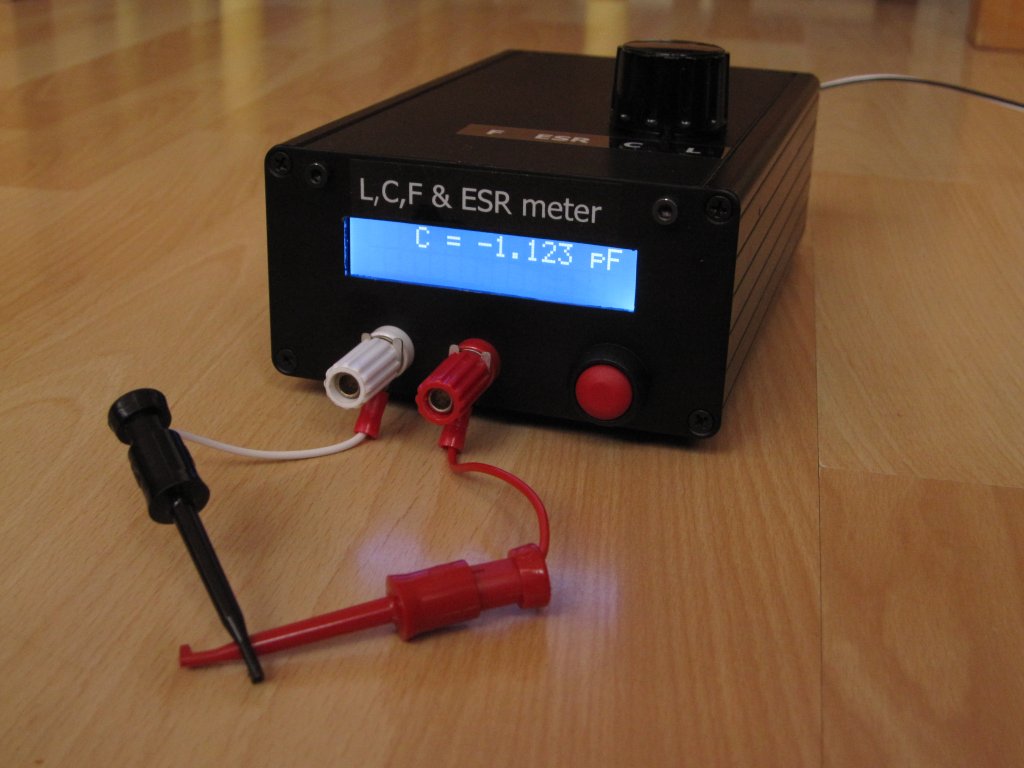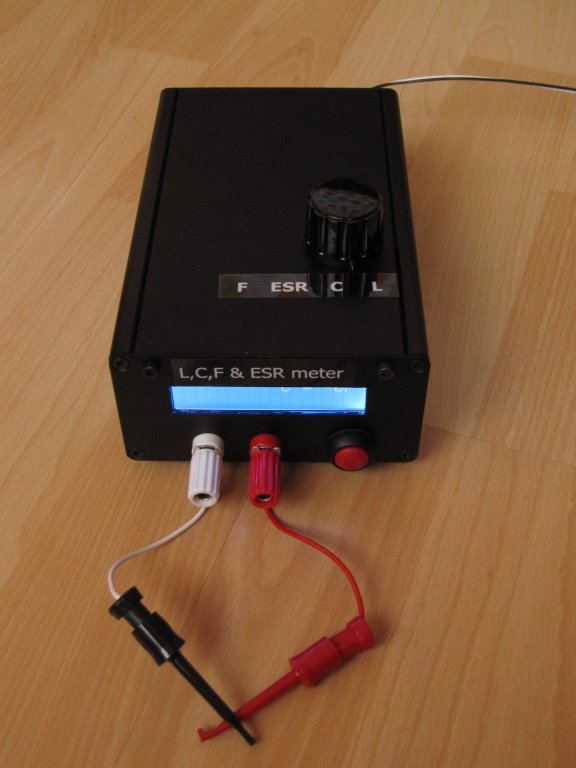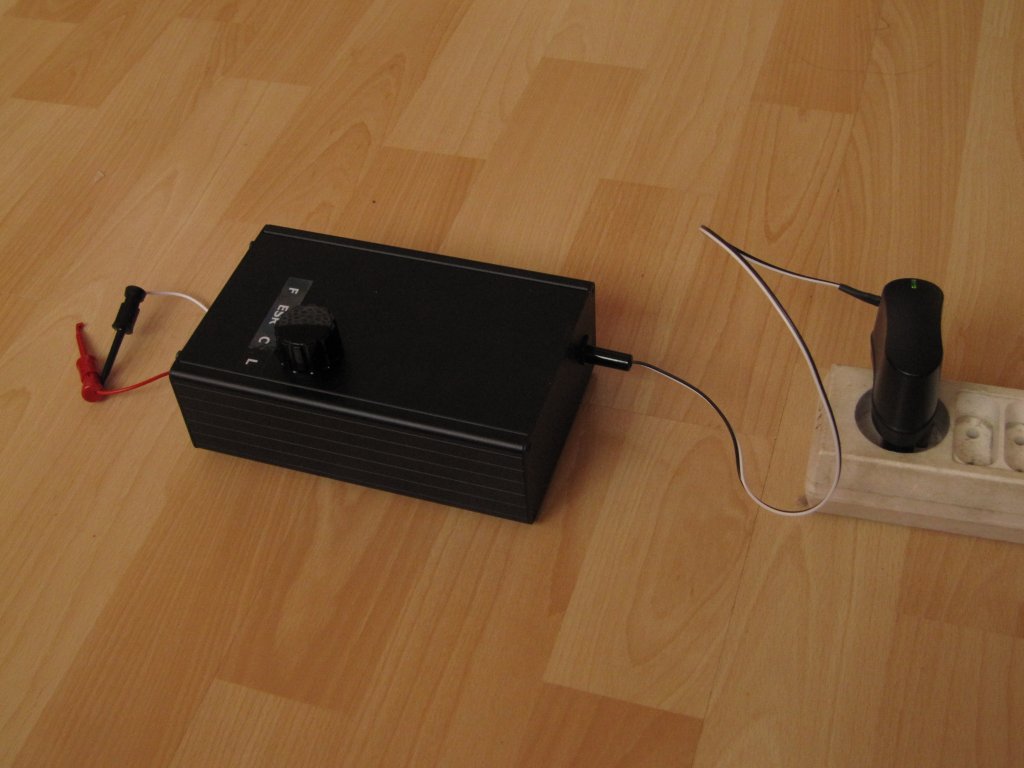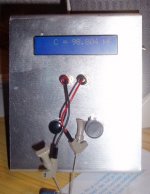I was in a search for a good LCR meter for my measurement devices collection.
I would like a LCR meter that has the option to select measurement frequentie and is able to measure equivalent series and parallel C & R.
I found a nice meter on eBay TH2821A its around 170 euro shipped to me.
It is able to do the measurements mentioned above at a maximum frequency of 10khz and with a
high accuracy about 0,3% tolerance (says the manual although).
I also knew of some DIY ESR meters which are MCU based, so i was wondering if there was a DIY project for a meter with my requirements.
I found out that there is a very nice solution for this, a guy called "Miguel Rusch" from Australia
has developed a LCR meter project for the design contest of microchip.
You can find the project here : Microchip 16-bit Embedded Control Design Contest
It is fully open source and claims to be within 1% accuracy, but i couldn't find the PCB for it 🙁
Any one has made this puppy ?
If the is enough interest for this project we could organise a group buy.
I attached the abstract manual from the project.
I would like a LCR meter that has the option to select measurement frequentie and is able to measure equivalent series and parallel C & R.
I found a nice meter on eBay TH2821A its around 170 euro shipped to me.
It is able to do the measurements mentioned above at a maximum frequency of 10khz and with a
high accuracy about 0,3% tolerance (says the manual although).
I also knew of some DIY ESR meters which are MCU based, so i was wondering if there was a DIY project for a meter with my requirements.
I found out that there is a very nice solution for this, a guy called "Miguel Rusch" from Australia
has developed a LCR meter project for the design contest of microchip.
You can find the project here : Microchip 16-bit Embedded Control Design Contest
It is fully open source and claims to be within 1% accuracy, but i couldn't find the PCB for it 🙁
Any one has made this puppy ?
If the is enough interest for this project we could organise a group buy.
I attached the abstract manual from the project.
Attachments
I'm also searching for a good LCR and ESR meter. I found this through Google:
ESR meter LC LCF LCR LCFESR L/C L/C/F inductivity capacity frequency capacitor measurement instrument AVR ATMega8 Mega88P
I tried mailing the author. Looks interesting.
ESR meter LC LCF LCR LCFESR L/C L/C/F inductivity capacity frequency capacitor measurement instrument AVR ATMega8 Mega88P
I tried mailing the author. Looks interesting.
Nice find. You need to know what you want to measure/archive with these meters.
Most manufacturers give there ESR and inductance rate at a measurement frequency of 100 khz the atmega will be way to slow to do this.
My find measures up to 10 khz.
So if you want a good meter so you can measure if a component meets its standards you need to be-cable of measuring its LCR at 100 khz.
If you only use your components at lower frequency you will be fine with that design. 🙂
Most manufacturers give there ESR and inductance rate at a measurement frequency of 100 khz the atmega will be way to slow to do this.
My find measures up to 10 khz.
So if you want a good meter so you can measure if a component meets its standards you need to be-cable of measuring its LCR at 100 khz.
If you only use your components at lower frequency you will be fine with that design. 🙂
From the description for the LCFesR 3.06 meter:
"Before each measurement the meter tries to discharge the capacitors in the measuring circuit for a half second. Afterward by giving a 5mA or 50 mA current pulse that holds in very short time (matched to 100 kHz measuring frequency), the meter measures the voltage that falls on the capacitor or on the measured resistance. From this it calculates the value of ESR."
"Before each measurement the meter tries to discharge the capacitors in the measuring circuit for a half second. Afterward by giving a 5mA or 50 mA current pulse that holds in very short time (matched to 100 kHz measuring frequency), the meter measures the voltage that falls on the capacitor or on the measured resistance. From this it calculates the value of ESR."
I could try testing some more or less accurate components that I have. I do have a simple capacitance meter and two scopes, but I'm not sure if that helps. I could also show it to some lab guys at work. They should have more accurate equipment.
While you've already ordered the kit, check out Analog's site -- they have a lot of new circuitry which generates the real and imaginary components -- some of the aps seem to be in hematology, some in corrosion measurement.
I've used their AD5933/4 chips -- it's not really suited for low-Z measurement right out of the can, but you can trick it into low-Z measurement. They've got a really neat design tool: Analog Devices: Interactive Design Tools: Impedance Measurement :
I've used their AD5933/4 chips -- it's not really suited for low-Z measurement right out of the can, but you can trick it into low-Z measurement. They've got a really neat design tool: Analog Devices: Interactive Design Tools: Impedance Measurement :
I have noticed these devices, it can measure(analyze) up to 100 khz this is limited to the sample speed of 1MSPS. The design i found has only 100KSPS allowing up to 10 khz only.
hi
i like buy
this lcr meter anybudy can help me
LCR meter up to 10khz using AD9833 & dsPIC30F4012 ("Miguel Rusch)
i like buy
this lcr meter anybudy can help me
LCR meter up to 10khz using AD9833 & dsPIC30F4012 ("Miguel Rusch)
Not that I'm aware of.
To get a higher sample rate some one could build this circuit using a FPGA to do the sampling.
That would be a very powerful tool to have.
To get a higher sample rate some one could build this circuit using a FPGA to do the sampling.
That would be a very powerful tool to have.
Hello johan,
I'm also interested to buy the same kit as you, could you post a small review of
the instrument, or saying what you think about it ?
How much does it cost also ?
I thank you in advance !
Frex
I'm also interested to buy the same kit as you, could you post a small review of
the instrument, or saying what you think about it ?
How much does it cost also ?
I thank you in advance !
Frex
Hello johan,
I'm also interested to buy the same kit as you, could you post a small review of
the instrument, or saying what you think about it ?
How much does it cost also ?
I thank you in advance !
Frex
Sorry, I missed your post. Here is the thread about the meter: http://www.diyaudio.com/forums/equipment-tools/185855-lrc-esr-meter-kit-built.html
I haven't used it much since I built it, so I haven't used its full capabilities, but sure it is nice to connect a capacitor or inductor/choke of almost any size to the test leads and get a reading. After making short test leads I get very stable readings.
Hello,
Thank you Johan, but i've already bought one on mid December and fully finished it the past weekend.
The ESR meter seem work well and it's a good device on my lab.
Some comparaison with the high-end RLC meter at my job reveal good precision.
Below, some pictures of the boxed RLC meter.
Regards.



FRex
Thank you Johan, but i've already bought one on mid December and fully finished it the past weekend.
The ESR meter seem work well and it's a good device on my lab.
Some comparaison with the high-end RLC meter at my job reveal good precision.
Below, some pictures of the boxed RLC meter.
Regards.
FRex
- Status
- Not open for further replies.
- Home
- Design & Build
- Equipment & Tools
- [DIY] LCR meter up to 10khz using AD9833 & dsPIC30F4012
